英语专业毕业论文(纯英文)
英语专业论文英语范文推荐(精选4篇)

英语专业论文英语范文推荐(精选4篇)选择英语文学的毕业论文选题可以从三个方向进行:国别文学研究、文学批评理论研究和比较文学研究。
问渠那得清如许,为有源头活水来,本文是勤劳的小编给家人们找到的英语专业论文英语范文推荐【精选4篇】,仅供参考,希望对大家有一些参考价值。
英语小论文800字篇一1.坚强的意志是成功的重要保证。
2.意志坚定的人才能完成伟大的使命,3.学生也是这样,不刻苦学习,终究不会成为有用之才There is an old saying: where there is a will, there is a way. It tells us that a strong will is the most essential quality that anyone who wants to achieve success. It can contribute a lot to one’s success.Although “All roads lead to Rome”, none of them is completely smooth. Our life is filled with obstacles which may make us feel so hopeless that we may choose to give up. At the crucial moment, strong will helps a lot. As a matter of fact, the ability to work through difficult situation and unfortunate events with strong will can make one stronger and more capable. In other words, if we want to realize life’s goal, we must keep forging ahead with strong consciousness.From what has been discussed above, we can see that the establishment of tough determination is of great importance to everyone. With a strong will, including our knowledge, we will be able to deal with any situation in our life. Whatever we do, as long as we stick to and do not give up easily, we will realize the goal at last.英语专业论文模板篇二“魅力新声”英语歌唱比赛不仅具有较高的学术含量,而且包含较浓厚的英语文化。
英文毕业论文范文
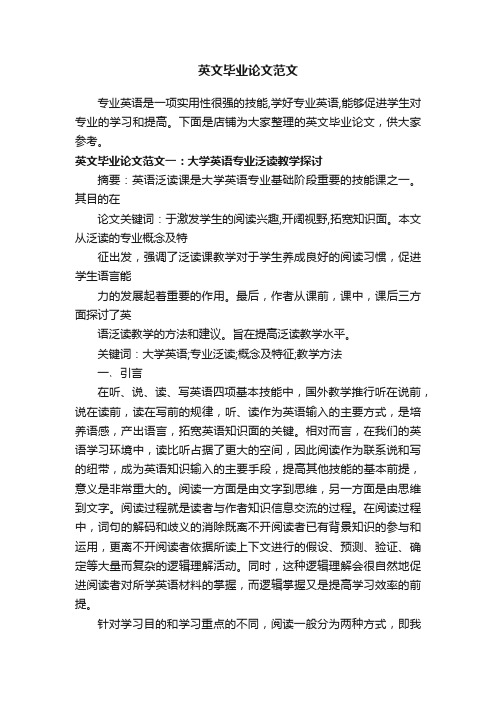
英文毕业论文范文专业英语是一项实用性很强的技能,学好专业英语,能够促进学生对专业的学习和提高。
下面是店铺为大家整理的英文毕业论文,供大家参考。
英文毕业论文范文一:大学英语专业泛读教学探讨摘要:英语泛读课是大学英语专业基础阶段重要的技能课之一。
其目的在论文关键词:于激发学生的阅读兴趣,开阔视野,拓宽知识面。
本文从泛读的专业概念及特征出发,强调了泛读课教学对于学生养成良好的阅读习惯,促进学生语言能力的发展起着重要的作用。
最后,作者从课前,课中,课后三方面探讨了英语泛读教学的方法和建议。
旨在提高泛读教学水平。
关键词:大学英语;专业泛读;概念及特征;教学方法一﹑引言在听、说、读、写英语四项基本技能中,国外教学推行听在说前,说在读前,读在写前的规律,听、读作为英语输入的主要方式,是培养语感,产出语言,拓宽英语知识面的关键。
相对而言,在我们的英语学习环境中,读比听占据了更大的空间,因此阅读作为联系说和写的纽带,成为英语知识输入的主要手段,提高其他技能的基本前提,意义是非常重大的。
阅读一方面是由文字到思维,另一方面是由思维到文字。
阅读过程就是读者与作者知识信息交流的过程。
在阅读过程中,词句的解码和歧义的消除既离不开阅读者已有背景知识的参与和运用,更离不开阅读者依据所读上下文进行的假设、预测、验证、确定等大量而复杂的逻辑理解活动。
同时,这种逻辑理解会很自然地促进阅读者对所学英语材料的掌握,而逻辑掌握又是提高学习效率的前提。
针对学习目的和学习重点的不同,阅读一般分为两种方式,即我们所开设的相关阅读课——精读和泛读。
尽管我们的英语教育向来重视阅读能力的培养,但长期以来一直侧重于对阅读材料的详细讲解,如字词,语法,修辞等,而忽略了阅读需要接触大量的不同的英文资料,广泛地拓宽学生的阅读视野,增加语言输入。
此外,详细的讲解也忽略了学生在阅读中的主观能动性的发挥,从而导致重精读轻泛读的现象,甚至使一些学生对阅读本身的作用产生了误解。
英语专业英语作文
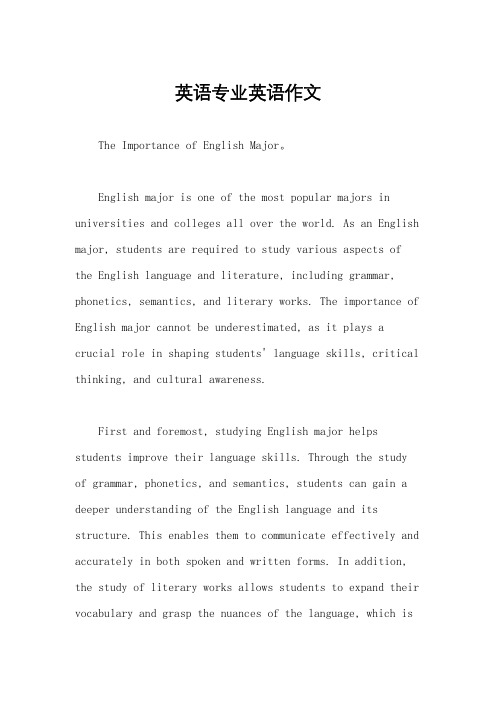
英语专业英语作文The Importance of English Major。
English major is one of the most popular majors in universities and colleges all over the world. As an English major, students are required to study various aspects of the English language and literature, including grammar, phonetics, semantics, and literary works. The importance of English major cannot be underestimated, as it plays a crucial role in shaping students' language skills, critical thinking, and cultural awareness.First and foremost, studying English major helps students improve their language skills. Through the study of grammar, phonetics, and semantics, students can gain a deeper understanding of the English language and its structure. This enables them to communicate effectively and accurately in both spoken and written forms. In addition, the study of literary works allows students to expand their vocabulary and grasp the nuances of the language, which isessential for effective communication.Furthermore, English major also fosters criticalthinking skills. In the process of analyzing literary works, students are required to think critically and interpret the underlying meanings of the texts. This not only enhances their analytical skills but also encourages them to think creatively and independently. Moreover, the study of literature exposes students to different perspectives and worldviews, which broadens their horizons and helps them develop a more open-minded and empathetic outlook.In addition, studying English major contributes to cultural awareness. Literature is a reflection of society, and by studying literary works from different time periods and cultures, students can gain insights into the customs, traditions, and values of various societies. This helpsthem develop a deeper appreciation for cultural diversity and fosters a sense of global citizenship. Moreover, the study of English literature also provides students with a platform to explore and understand their own cultural heritage, which is essential for personal identity andself-awareness.In conclusion, English major is of great importance as it not only helps students improve their language skills but also fosters critical thinking and cultural awareness. It equips students with the necessary tools to communicate effectively, think critically, and understand the complexities of the world around them. Therefore, English major is a valuable and indispensable field of study that prepares students for success in both their personal and professional lives.。
英语专业论文范文
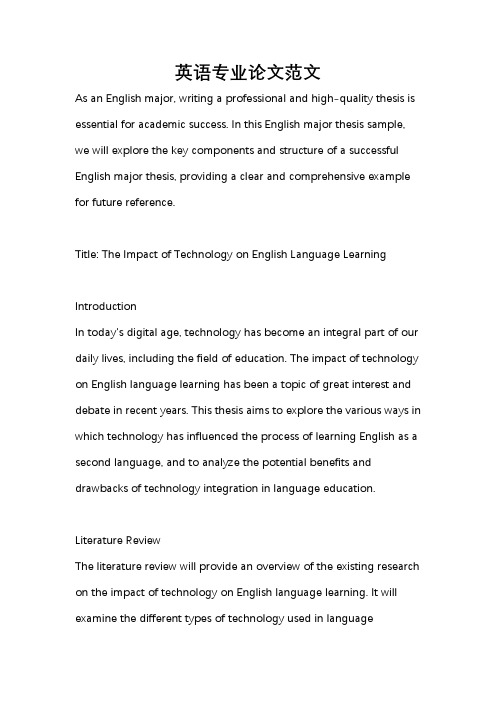
英语专业论文范文As an English major, writing a professional and high-quality thesis is essential for academic success. In this English major thesis sample, we will explore the key components and structure of a successful English major thesis, providing a clear and comprehensive example for future reference.Title: The Impact of Technology on English Language LearningIntroductionIn today's digital age, technology has become an integral part of our daily lives, including the field of education. The impact of technology on English language learning has been a topic of great interest and debate in recent years. This thesis aims to explore the various ways in which technology has influenced the process of learning English as a second language, and to analyze the potential benefits and drawbacks of technology integration in language education.Literature ReviewThe literature review will provide an overview of the existing research on the impact of technology on English language learning. It will examine the different types of technology used in languageeducation, such as online learning platforms, language learning apps, and digital language resources. The review will also discuss the effectiveness of these technologies in improving language proficiency and the potential challenges they may pose for language learners.MethodologyThis section will outline the research methodology used in this study, including the research design, data collection methods, and data analysis techniques. The study will utilize both qualitative and quantitative research methods to gather and analyze data on the impact of technology on English language learning. The research design will aim to provide a comprehensive understanding of the various factors that influence language learning outcomes in the digital age.FindingsThe findings section will present the results of the study, highlighting the key findings related to the impact of technology on English language learning. This will include an analysis of the benefits and drawbacks of technology integration in language education, as well as the factors that contribute to the effectiveness of technology-based language learning tools. The findings will also discuss the implications of the study for language educators and learners.DiscussionThe discussion section will interpret the findings in the context of existing literature and theoretical frameworks. It will explore the implications of the study for language education practice and policy, as well as the potential areas for future research in this field. The discussion will also address the limitations of the study and provide recommendations for further research on the topic.ConclusionIn conclusion, this English major thesis sample provides a comprehensive analysis of the impact of technology on English language learning. The study highlights the potential benefits and drawbacks of technology integration in language education, and offers insights for language educators and learners. By understanding the influence of technology on language learning, educators can make informed decisions about the use of technology in language education, and learners can leverage technology to enhance their language proficiency.。
英语专业毕业论文范文(1)

英语专业毕业论文范文A Brief Analysis of english teaching in senior high schoolAbstract: Classroom teaching is the main way for students to learn En glish. But in senior high school, a lots of probelms still exsit in t he English teaching especially in the teaching of reading and writing. In this paper, the importance and methods of reading and writing w ill be further discussed. Key words: reading writing techniqu esIntroduction: Classes should be learner-centered, with meaningful, fu nctional activities, often, classes begin by finding out what the stu dents don’t know. These classes operate on the assumption that there is a great deal of information that students lack and that the teache r and textbooks will impact that information to the students. Teacher s who hold this assumption view students as plants waiting passively to be fed and watered. But I think the students should be regarded as explorers, active learners who bring a great deal to the learning pr ocess and at the same time, draw from their environment as they devel op new understandings. The basic principle will be used in the teachi ng of reading and writing.Section One------ How to teach readingI. Why teach readingThere are many reasons why getting students to read English texts is an im portant part of the teacher’s job. In the first place, many of them want to be able to read texts in English either for their career s, for study purposes or simply for pleasure. Anything we can do to m ake reading easier for them must be a good idea.Reading texts provide good models for English writing, provide opp ortunities to study language vocabulary, grammar, punctuation, and th e way to construct sentences, paragraphs and texts. Lastly, good read ing texts can introduce interesting topics, stimulate discussion, exc ite imaginative responses and be the springboard for well-rounded, fa scinating lessons.The last but not the least, students must read widely because only a fraction of knowledge about the world can come from other experien ces in their short lives.II. What kind of reading should students do?When the teachers give reading class to students, they should noti ce a balance----a balance to be struck between real English on the on e hand and the students’ capabilities and interests on the other. There is some authentic written material which beginner students can un derstand to some degree: menus, timetables, signs and basic instructi ons, for example, and, where appropriate, teachers can use these. But for longer prose, teachers can offer their students texts, which, wh ile being like English, are nevertheless written or adapted especiall y for their level. Anyway, the materials to be read should be interes ting and meaningful. Teachers should become better acquainted with bo oks written specially for teenagers and dealing with their problems. III. What are the principles behind the teaching of reading?i) Permit Students To ReadNo one has learned to swim by practicing the skills of backstrokes, f lutter kicks or treading water while staying on the edge of the swimm ing pool. Yet, in the teaching of reading teachers often do just that. Rather than let the students into “the water”, teachers keep them in skills books learning rules about letters, syllables or definition s of words rather than letting them into the book itself, permitting them to be immersed in the language which comes from the authors as the readers try to reconstruct the written message.ii) Encourage students to respond to the content of a reading text, n ot just to the languageOf course, it is important to study reading texts for the way they us e language, how many paragraphs they contain and how many times they use relative clauses. But the meaning, the message of the text, is mu ch more important. Teachers should help students understand that the main reason to read is for them. They have to have their own purpose to read and reading must make sense, they have to find ways of doing something about it. They should be encouraged either to reread or to continue reading to gain meaning. But they must realize that the mean ing is not in the teacher, but in the interaction between the reader and author. Students should be encouraged to ask themselves repeatedl y, “Does this make sense to me?” Students should be encouraged to r eject and to be intolerant of reading materials that do not make sens e.iii) Encourage students to guess or predictReaders’ guesses or predictions are based on the cumulative infor mation and syntactic structure they have been learning as they have b een reading. Therefore, their guesses are more often than not appropr iate to the materials. Students have to realize that risk taking in r eading is appropriate; that using context to decide what words mean i s a proficient reading strategy and that they have the language sense to make appropriate guesses which can fit both the grammatical and s emantic sense of what they are reading.iv) Match the task to the topicOnce a decision has been taken about what kind of reading text the students are going to read, teachers need to choose good reading tas ks—the right kind of questions and useful puzzles, etc. Asking borin g and inappropriate questions can undermine the most interesting text; the most commonplace passage can be made really exciting with imagin ative and challenging tasks. Working in groups, the English teacher a nd students take turns asking each other questions following the read ing. The teacher may ask, “ What is the significance of the characte r’s age?” These questions require inferences based on details from the reading text.Section Two------How to teach writing (Developing correctness in stud ents’ writing)“Students learn to write by writing, and they learn to write co rrectly by writing, revising, and proofreading their own work”---wit h some help or direction from the teacher when it is necessary. They do not learn to write correctly by studying about writing or doing is olated workbook exercises unrelated to their own writing. So, the mos t important technique a teacher can use to guide students toward gram matically correct writing is to let them write, let them write things related to their own experiences. There is no limit to the kinds of text the teacher can ask students to write. Teachers’ decisions, tho ugh, should based on how much language the students know, what their interests are.“Do I read a paper and ignore all punctuation, what good is that for studentsWe spend hours at night with papers---I’m not sure the students get as much from it as the time I spend on it.”These comments by senior high school English teachers discussing the process of marking student papers reflect the dissatisfaction an d frustration of many teachers over the problem of dealing with the e rrors in student writing-----the obvious mistakes in spelling, punctu ation----Traditionally, teachers have worked to correct errors in two ways: by teaching grammatically correctness through exercise in gram mar texts; by pointing out all errors when making student papers.Most students find it very dispiriting if they get a piece of wr itten work back and it is covered in red ink, underlings and crossing -out. It is a powerful visual statement of the fact that their writte n English is terrible. Of course, some pieces of written work are com pletely full of mistakes, but even in these cases, the teacher has toachieve a balance between being accurate and truthful on the one han d and treating students sensitively and sympathetically on the other.Some techniques can be used in dealing with the errors in studen t papers:i) SelectivityRather than engage in intensive error-correction when responding to s tudent writing, teachers are encouraged to adopt a more moderate appr oach to error. If the teacher over-corrects the students’ mistakes, the students would be likely to focus on errors instead of ideas. Stu dents are more likely to grow as writers when the teacher’s primary purpose in reading student papers is to respond to content. However, if attention to content and correctness are combined when making pape rs, it is more helpful to select one or two kinds of errors the indiv idual student is making than to point out every error in the paper. T he teacher can identify a selected error, show an example or two on t he student paper, and either explain the correct form or direct the s tudent to a handbook for further explanation. It is always worth writ ing a comment at the end of a piece of written work -----anything fro m “Well done” to “This is a good story, but you must look again at your use of past tenses---see X grammar book page xx.”ii) Error-analysisAnother method for working with student error, one that can be especi ally fruitful for teachers, is to approach it from an analytic perspe ctive. Teachers, as error-analyst, look for patterns in the errors of an individual student, tries to discover how the mistake arrived at the mistakes by analyzing the error (Lack of knowledge about a certai n grammatical point; A careless one or a mis-learned rule?), and plan s strategies accordingly.iii) Publish Student WritingThe final basic strategy is publishing. Students need a reason for la boring over a draft until it is perfect; the urge to see oneself in p rint can be a powerful drive toward revision and proofreading.Conclusion: As teachers to the students who are in senior high sch ool, t hey should learn to turn students’ hard work toward supporting the language strengths students already have, proving students with a feeling of success, finding materials and planning classroom experie nces will turn students on to reading and writing, the reading and wr iting will develop with much greater ease than it does at the present time.Reference:Gu Xueliang, The Basic Technical Training in English Teaching, Hangzhou University Press, 1998.Wilga M.Rivers & Mary S. Temperley, A practical guide to the teaching of English as a second or foreign Language, New York: Oxford Univers ity Press, 1978Smith F. Understanding Reading (2d ed), New York: Holt, Rinehart an d Winston, 1978毕业答辩注意事项及技巧1、自己为什么选择这个课题?2、研究这个课题的意义和目的是什么?3、全文的基框架、基结构是如何安排的?4、全文的各部分之间逻辑关系如何?5、在研究课题的过程中,发现了那些不同见解?对这些不同的意见,自己是怎样逐步认识的?又是如何处理的?6、论文虽未论及,但与其较密切相关的问题还有哪些?7、还有哪些问题自己还没有搞清,在论文中论述得不够透彻?8、写作论文时立论的主要依据是什么?对以上问题应仔细想一想,必要时要用笔记整理出来,写成发言提纲,在答辩时用。
大学英语专业作文
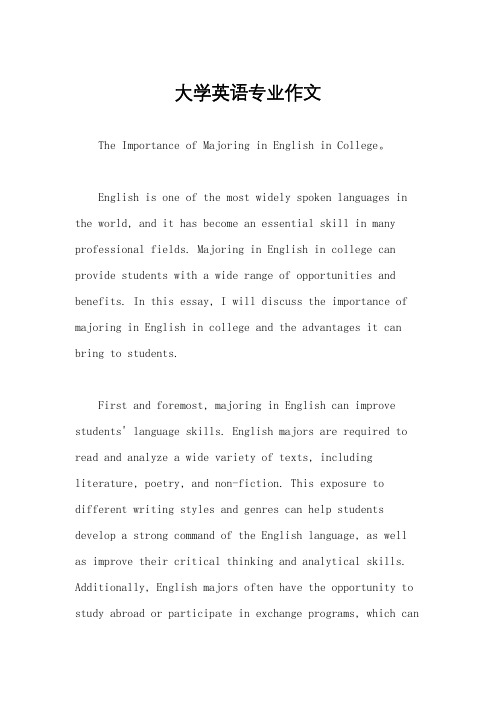
大学英语专业作文The Importance of Majoring in English in College。
English is one of the most widely spoken languages in the world, and it has become an essential skill in many professional fields. Majoring in English in college can provide students with a wide range of opportunities and benefits. In this essay, I will discuss the importance of majoring in English in college and the advantages it can bring to students.First and foremost, majoring in English can improve students' language skills. English majors are required to read and analyze a wide variety of texts, including literature, poetry, and non-fiction. This exposure to different writing styles and genres can help students develop a strong command of the English language, as well as improve their critical thinking and analytical skills. Additionally, English majors often have the opportunity to study abroad or participate in exchange programs, which canfurther enhance their language proficiency and cultural awareness.Furthermore, majoring in English can open up a wide range of career opportunities. In today's globalized world, many companies and organizations are looking for employees who are proficient in English and can effectively communicate with people from different cultural backgrounds. English majors are well-equipped to pursue careers infields such as journalism, publishing, public relations,and international business. They can also work as teachers, translators, or interpreters, or pursue graduate studies in fields such as law, education, or communication.In addition to improving language skills and career prospects, majoring in English can also broaden students' horizons and deepen their understanding of the world. Through the study of literature, students can gain insights into different cultures, historical periods, and social issues. They can also develop empathy and compassion by engaging with diverse characters and perspectives. Moreover, the critical thinking and research skills that Englishmajors acquire can be applied to a wide range of academic and professional pursuits, making them versatile and well-rounded individuals.Despite the numerous benefits of majoring in English, some people may question the practicality of pursuing a degree in this field. They may argue that English majors face limited job prospects and lower earning potential compared to those in STEM or business-related fields. However, it is important to recognize that the skills and knowledge gained from studying English are highly transferable and can be applied to a variety of careers. Moreover, the demand for English language proficiency isonly expected to grow, especially in the fields of technology, marketing, and international relations.In conclusion, majoring in English in college can provide students with valuable skills, career opportunities, and a deeper understanding of the world. By improving language proficiency, critical thinking, and cultural awareness, English majors can become well-roundedindividuals who are prepared to succeed in a diverse andinterconnected global society. Therefore, I believe that majoring in English is a worthwhile and rewarding pursuit for college students.。
英文论文(优秀4篇)
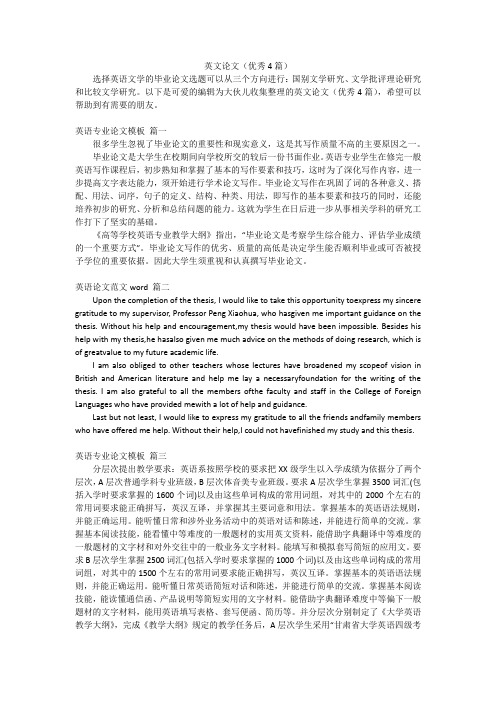
英文论文(优秀4篇)选择英语文学的毕业论文选题可以从三个方向进行:国别文学研究、文学批评理论研究和比较文学研究。
以下是可爱的编辑为大伙儿收集整理的英文论文(优秀4篇),希望可以帮助到有需要的朋友。
英语专业论文模板篇一很多学生忽视了毕业论文的重要性和现实意义,这是其写作质量不高的主要原因之一。
毕业论文是大学生在校期间向学校所交的较后一份书面作业。
英语专业学生在修完一般英语写作课程后,初步熟知和掌握了基本的写作要素和技巧,这时为了深化写作内容,进一步提高文字表达能力,须开始进行学术论文写作。
毕业论文写作在巩固了词的各种意义、搭配、用法、词序,句子的定义、结构、种类、用法,即写作的基本要素和技巧的同时,还能培养初步的研究、分析和总结问题的能力。
这就为学生在日后进一步从事相关学科的研究工作打下了坚实的基础。
《高等学校英语专业教学大纲》指出,“毕业论文是考察学生综合能力、评估学业成绩的一个重要方式”。
毕业论文写作的优劣、质量的高低是决定学生能否顺利毕业或可否被授予学位的重要依据。
因此大学生须重视和认真撰写毕业论文。
英语论文范文word 篇二Upon the completion of the thesis, I would like to take this opportunity toexpress my sincere gratitude to my supervisor, Professor Peng Xiaohua, who hasgiven me important guidance on the thesis. Without his help and encouragement,my thesis would have been impossible. Besides his help with my thesis,he hasalso given me much advice on the methods of doing research, which is of greatvalue to my future academic life.I am also obliged to other teachers whose lectures have broadened my scopeof vision in British and American literature and help me lay a necessaryfoundation for the writing of the thesis. I am also grateful to all the members ofthe faculty and staff in the College of Foreign Languages who have provided mewith a lot of help and guidance.Last but not least, I would like to express my gratitude to all the friends andfamily members who have offered me help. Without their help,I could not havefinished my study and this thesis.英语专业论文模板篇三分层次提出教学要求:英语系按照学校的要求把XX级学生以入学成绩为依据分了两个层次,A层次普通学科专业班级,B层次体音美专业班级。
英语专业毕业论文
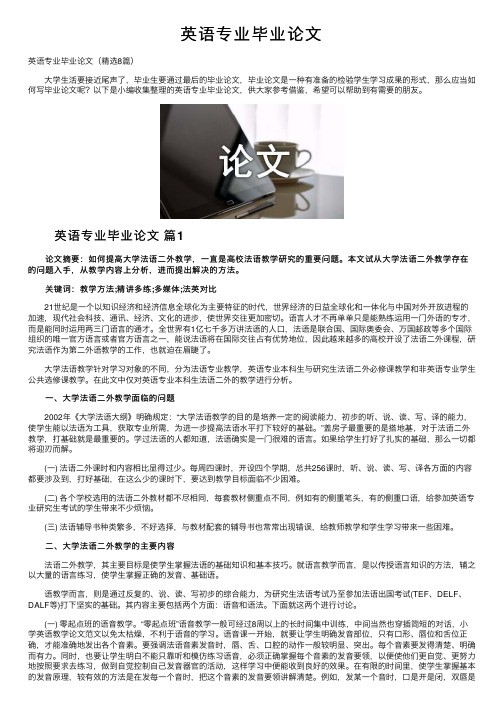
英语专业毕业论⽂英语专业毕业论⽂(精选8篇) ⼤学⽣活要接近尾声了,毕业⽣要通过最后的毕业论⽂,毕业论⽂是⼀种有准备的检验学⽣学习成果的形式,那么应当如何写毕业论⽂呢?以下是⼩编收集整理的英语专业毕业论⽂,供⼤家参考借鉴,希望可以帮助到有需要的朋友。
英语专业毕业论⽂篇1 论⽂摘要:如何提⾼⼤学法语⼆外教学,⼀直是⾼校法语教学研究的重要问题。
本⽂试从⼤学法语⼆外教学存在的问题⼊⼿,从教学内容上分析,进⽽提出解决的⽅法。
关键词:教学⽅法;精讲多练;多媒体;法英对⽐ 21世纪是⼀个以知识经济和经济信息全球化为主要特征的时代,世界经济的⽇益全球化和⼀体化与中国对外开放进程的加速,现代社会科技、通讯、经济、⽂化的进步,使世界交往更加密切。
语⾔⼈才不再单单只是能熟练运⽤⼀门外语的专才,⽽是能同时运⽤两三门语⾔的通才。
全世界有1亿七千多万讲法语的⼈⼝,法语是联合国、国际奥委会、万国邮政等多个国际组织的唯⼀官⽅语⾔或者官⽅语⾔之⼀,能说法语将在国际交往占有优势地位,因此越来越多的⾼校开设了法语⼆外课程,研究法语作为第⼆外语教学的⼯作,也就迫在眉睫了。
⼤学法语教学针对学习对象的不同,分为法语专业教学,英语专业本科⽣与研究⽣法语⼆外必修课教学和⾮英语专业学⽣公共选修课教学。
在此⽂中仅对英语专业本科⽣法语⼆外的教学进⾏分析。
⼀、⼤学法语⼆外教学⾯临的问题 2002年《⼤学法语⼤纲》明确规定:“⼤学法语教学的⽬的是培养⼀定的阅读能⼒,初步的听、说、读、写、译的能⼒,使学⽣能以法语为⼯具,获取专业所需,为进⼀步提⾼法语⽔平打下较好的基础。
”盖房⼦最重要的是搭地基,对于法语⼆外教学,打基础就是最重要的。
学过法语的⼈都知道,法语确实是⼀门很难的语⾔。
如果给学⽣打好了扎实的基础,那么⼀切都将迎刃⽽解。
(⼀) 法语⼆外课时和内容相⽐显得过少。
每周四课时,开设四个学期,总共256课时,听、说、读、写、译各⽅⾯的内容都要涉及到,打好基础,在这么少的课时下,要达到教学⽬标⾯临不少困难。
- 1、下载文档前请自行甄别文档内容的完整性,平台不提供额外的编辑、内容补充、找答案等附加服务。
- 2、"仅部分预览"的文档,不可在线预览部分如存在完整性等问题,可反馈申请退款(可完整预览的文档不适用该条件!)。
- 3、如文档侵犯您的权益,请联系客服反馈,我们会尽快为您处理(人工客服工作时间:9:00-18:30)。
English Major Graduation Thesis
Introduction
The aim of this thesis is to investigate the impact of technology on the teaching and learning of English as a second language. Over the past few decades, technology has greatly changed the way we live and communicate with each other. English language teaching is no exception to this trend, with technology now playing a crucial role in educational settings around the world.
The purpose of this study is to identify the specific ways in which technology has impacted English language education and to evaluate the effectiveness of these new methods. The findings of this research can help educators better understand the benefits and limitations of using technology in the classroom, and can inform future developments in teaching techniques and language learning.
Literature Review
The use of technology in education has been growing rapidly in recent years. Many studies have examined the impact of technology on language learning, and a growing body of research has focused on the use of mobile devices, such as smartphones and tablets, in language teaching.
One of the key benefits of technology in language learning is flexibility. Digital materials, such as online courses, e-books, and multimedia resources, offer learners the ability to learn anytime and anywhere. In particular, mobile devices afford a high degree of flexibility, enabling learners to study on the go, outside of formal classroom settings.
Another benefit of technology is the ability to provide personalized learning. With the use of online platforms and tools, educators can adapt their teaching to individual learners’ needs, providing a more effective and efficient learning experience. For example, automated language learning platforms can provide personalized feedback and support, allowing learners to work at their own pace and improve their language proficiency.
However, there are also some limitations to using technology in language learning. One of the key challenges is the need for digital literacy, particularly among older learners or those with limited access to technology. In addition, the cost of implementing technology in the classroom can be a barrier, particularly for low-income students or schools.
Research Methodology
To investigate the impact of technology on English language teaching and learning, this study employs a mixed-methods research approach. This includes both qualitative and quantitative data collection and analysis.
The qualitative component of the study involves semi-structured interviews with English language educators and learners, as well as classroom observations and analysis of digital materials used in teaching. The quantitative component includes a survey of English language learners, involving both open-ended and closed-ended questions.
Data analysis will involve both coding of qualitative data and statistical analysis of the survey data. The study will also include a comparative analysis of the effectiveness of traditional teaching methods versus technology-enhanced teaching methods.
Conclusion
The growing use of technology in education and the increasing demand for English language proficiency have made it essential to understand the impact of technology on English language teaching and learning. This study aims to provide insights into the effectiveness of technology in language education, identify the benefits and challenges of using technology, and inform future developments in language teaching techniques.
The findings of this research can be used by educators and policy-makers to improve the quality and accessibility of English language education, particularly in countries where English is not the primary language. By understanding the potential of technology in language learning, educators can create more effective and efficient teaching methods that meet the needs of learners in the 21st century.。
